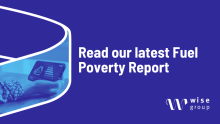HALF OF IN WORK FAMILIES ELIGIBLE FOR FUEL VOUCHERS ARE VISITING FOODBANKS as the cost-of-living crisis continues to ravage communities of all ages.
Families with young children have been hit hardest, with 4 in 5 single parents saying their mental health had been impacted by the cost-of-living crisis, with families with children the only group to ration energy more than food.
On the other hand, 43% of retired people surveyed said they ration food when bills are tight, at the cost of extreme physical and mental deterioration, with food being the first to go for 27% of working age households.
Among those eligible for fuel vouchers, 80% of disabled people said their physical health has deteriorated as a result of rising bills, and over 77% of people said that their mental health had been impacted by spiralling costs.
These are some of the results of a LARGEST-OF-ITS-KIND INVESTIGATION by the Wise Group, the UK’s leading relational mentoring social enterprise, who interviewed over 300 people and used insight from 65,000 vulnerable households to find solutions in the fight against poverty.
The results were launched before a crowd including Ofgem, the NHS, politicians, and civil servants at Parliament this week.
Focus groups featured in the report recounted how children are being hospitalised by dilapidated conditions in households, medical equipment is being turned off, pensioners are foregoing food, all while unprecedented levels of financial support is being rolled out to prevent a Victorian situation becoming a medieval one. Quick fixes are fixing little.
One of the starkest findings was that over TWO-THIRDS of people on prepayment meters said their physical health had been impacted by the cost-of-living crisis or preferred not to say, compared to less than 50% on other payment types.
Foodbank use was also 50% greater for those on prepayment meters than those on other payment types.
Fear of being cut off has reached extreme levels, with one individual reporting that they had hoarded £600 on her prepayment meter out of terror of going without energy and had rationed food to do so.
On being cut off, Alex from Glasgow said: “I was left without power for a year in my house. I was still getting bills from the last tenant, and I was cut off. When that cold snap came there, I was put down as priority, but it was still 3 weeks until they put a new meter in. I had 5 hours on the phone until I would get an answer. I only got the meter changed because my mentor put in a formal complaint.”
Asked if he had visited a warmbank he said: “I was going up to the hospital to see the wean and there was a wee woman on the bus, and she said that’s where she was going. An old woman came out in the rain. We’ve got one across the road and I don’t think anyone knows. Its open 5 days a week and I don’t think one person has used it. It’s a cold room with one table a group of chairs and an empty urn. The staff are very much of the opinion they are there to open up and close up.”
Another person in the group, Diane, said: “I’ll tell you a friend of mine who has a mental health problem, and he’s absolutely petrified of his energy that it’s going to get cut off. And he constantly puts money into his online account. But he can’t afford. So much so he’s 600 in credit with his electricity. Just for the fear he’s going to get cut off he doesn’t understand. And I say you’re going to need to stop doing that.“
The report also evidences the impact that a trusting and perceptive relationship with a mentor can have. Yvonne, a Wise Group Mentor, recounted the case of an older lady being treated for cancer: “This lady is undergoing treatment for cancer and is poorly. Macmillan’s had contacted us because she had switched off her heating through fear of costs. When I first spoke with her, she told me her heating system had cost her £110 in 10 days.
When I let her know a couple of days later that she had been awarded £821.97 she was overwhelmed. Even her daughter had been trying to get her to put the heating on for her health and recovery. With that credit in her account, she promised to put her heating on, and we will be working on getting her back on her feet from there”
The report will recommend a permanent ban on forced pre-payment meter conversions, including low-income households in support schemes, the introduction of longer term financial and mentoring support and the replacement of the energy price cap with a system where support is proportional to need.
Sean Duffy, CEO of the Wise Group said: “We know what poverty looks, smells, sounds, tastes and feels like, and we know what it costs.
This winter, our mentors conducted hundreds of frank and insightful interviews with those most in need, breaking down barriers with kindness and compassion in search of viable solutions to the cost-of-living crisis.
As the UK’s leading relational mentoring social enterprise, every year we meaningfully support over 65,000 households to break the cycle of poverty, at home, at work and in the community. Through this crisis, we have distributed millions of pounds in financial support and cleared millions of pounds of debt – with change locked in with relational mentoring.
Across communities, people seek to have their voices heard and listened to, their ideas given fair hearing and their stories told. Kindness and compassion are never far off, and they go a long, long way.”
—
Click here to read the Wise Group’s Fuel Poverty report 2023











